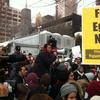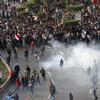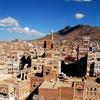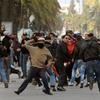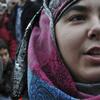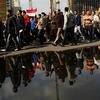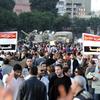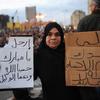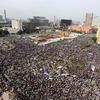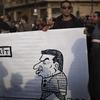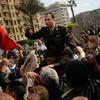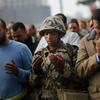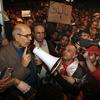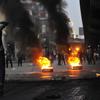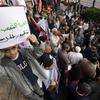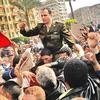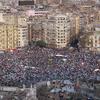Protests Spread Through Arab World
It's A Free Country and WNYC bring you coverage of pro-democracy protests spreading throuhgout the Arab world, from Tunisia to Yemen to Egypt.
The Twitter Conversation On The Arab World: Mubarak Detained, Sick
Friday, January 28, 2011
UPDATE April 13: We've adjusted the widget settings to better reflect the news about Hosni Mubarak.
Protests continue to spread throughout the Arab world, and Twitter is tracking many of the developments. Below is a stream of some common search terms that we hope will help you follow the events.
At Anti-Mubarak Rally, Anger and Optimism from Egyptians
Saturday, January 29, 2011
PHOTOS | In New York, Hundreds Rally to Support Egyptian Protesters
Monday, January 31, 2011
PHOTOS: Hundreds of protesters gathered outside the United Nations headquarters in New York City this weekend calling for the resignation of Egyptian President Hosni Mubarak.
Egypt and the US: How Will They Proceed?
Monday, January 31, 2011

The Mix: From Washington To Cairo
Friday, January 28, 2011
Welcome to It's A Free Country's The Mix, where we take some of the notable clips from this week's news and mix 'em up. Remember the State of the Union address? This week felt like it was split in two - pre- and post-game for President Obama's big speech; and then all attention turned to the Middle East, where pro-democracy protests spread from Tunisia to Yemen and then, on Friday, rocked the streets of Egypt.
The Mix reflects this week's two halves, with clips from our coverage of the State of the Union followed by the reaction to the Arab protests from Hillary Clinton; Yemeni blogger Walid Al-Saqaf offering a word of caution;Steven Cook of the Council on Foreign relations talking about the implications of Egypt's protests; and write Mona Eltahawy with an optimistic view of the spread of democracy.
All Eyes on Egypt
Friday, January 28, 2011
Watching events unfold in Egypt, it’s hard to believe that I was there 3 weeks ago. I went as part of a tour that whisked us around the country, seeing all of its incredible ancient sites. With a packed itinerary, we didn’t have much free time to explore Egypt’s cities on our own, and I can’t say that I got a feel for what life in Egypt is like. But I watched hundreds of miles of Egypt go by through the windows of buses, cars and trains and here’s a taste of what I saw:
The U.S. Response to the Protests in Egypt
Friday, January 28, 2011

Protests in Yemen
Friday, January 28, 2011
From Tunisia to Egypt: Protests for Democracy in the Arab World
Thursday, January 27, 2011

Paradigm Shift: Wikileaks and the New York Times
Friday, January 28, 2011

What Tunisia's Revolution Means to Arab Americans
Friday, January 21, 2011
How Much Does Tech Drive Revolutions?
Wednesday, January 19, 2011
The Silence of Friends
Friday, January 28, 2011
Muslim New Yorkers Watch Egypt Protests With Hope and Fear
Sunday, January 30, 2011
Egypt 101: Questions, Answers, Guides
Monday, January 31, 2011
When Quiet Diplomacy May Beat Grandstanding
Monday, January 31, 2011

On Friday, Americans discovered they didn’t need a television to catch the most gripping program around – and that, in most parts of the country, TV wouldn’t help them.
Egypt Protests One Week In
Monday, January 31, 2011
Update on Egypt
Monday, January 31, 2011
Blake Hounshell, managing editor of Foreign Policy, joins us from Doha, Qatar, to give an update on what’s happened in Egypt over the weekend, plans for tomorrow’s nation-wide strike, and what the impact of the protests have been throughout the region.
Have You Been Witness To Revolution?
Tuesday, February 01, 2011
Live Chat: Egypt Context and Conversation
Tuesday, February 01, 2011
Today at noon, join us for a live chat about the Egyptian protests. Brian Lehrer and It's A Free Country's Jody Avirgan will be joined by two Middle East scholars - Lawrence Pintak, dean of the Edward R. Murrow College of Communication at Washington State University and author of The New Arab Journalist; and Stephen Zunes, chair of the program in Middle Eastern Studies at San Francisco State University.
Please note that all comments are moderated by WNYC producers - thanks in advance for your patience. We'll do our best to publish every appropriate comment, but if traffic is heavy we may not be able to.
Prince Hassan of Jordan on the Future of the Mideast
Tuesday, February 01, 2011
Jordan's King Abdullah has sacked his government following protests as thousands marched in Amman to protest rising prices and unemployment and to demand that the prime minister, Samir Rifai step down. Prince Hassan of Jordan reacts to the news and talks about the future of the Mideast and the view of Egypt from Jordan. Shibley Telhami, Anwar Sadat Professor for Peace and Development at the University of Maryland also weighs in.
Massive Protests Continue in Egypt
Tuesday, February 01, 2011
As the political tumult in Egypt enters an eighth day, the government of authoritarian President Hosni Mubarak suffered a major blow last night when the Army announced that it would not use violence to suppress the opposition movement that has formed against him. Meanwhile, protesters are expected to engage in a massive march and general strike calling for Mubarak's ouster today.
Mubarak Regime Clings to Power
Tuesday, February 01, 2011
As thousands continue to protest in Egypt, President Mubarak's days in power may be coming to an end. The question of how long Mubarak can survive given the economics in the country. Gas is running out, supplies are not coming in, unemployment is high. Samer Sheheta, professor of Arab politics at the Center for Contemporary Arab Studies at Georgetown University weighs in. With one million protesters openly demonstrating against the government, how much longer can the Mubarak regime hold power?
Will the Muslim Brotherhood Rule in Egypt?
Tuesday, February 01, 2011
There are concerns that the Muslim Brotherhood may try to take over if Mubarak cedes power. The group advocates a return to Sharia law and is banned in Egypt. However, according to Mohammad Mursi, an MP for the Muslim Brotherhood from 2000-2005 insists that the Brotherhood simply wants democracy.
Where America Stands on Democracy in the Middle East
Tuesday, February 01, 2011
The United States is performing a difficult balancing act in how to respond to the tumult in Egypt. The Obama administration was quick to show support for protesters who are pushing for democratic reform in the Middle East, but hasn't forcefully called for the end to Mubarak's regime.
Cairo: Voices from the Crowd
Tuesday, February 01, 2011
Protesters are witnessing a historic moment in Egypt. We go into the crowd in Tahrir Square where hundreds of thousands have gathered. BBC correspondent Lyse Dousset describes the scene, where Egyptians are jubiliant as they continue to call for the resignation of President Mubarak.
Oil Prices Spike Amid Turmoil in Egypt
Tuesday, February 01, 2011
Oil prices have been floating around $90 a barrel for weeks, but now, the turmoil in Egypt has pushed the price up. Crude oil jumped close to 4% on Friday and then 3.2% yesterday to settle at $92.19 a barrel. However, the output of crude hasn’t changed in the region, so what exactly explains the sharp rise in prices?
Jubilation as Crowds Converge in Cairo's Tahrir Square
Tuesday, February 01, 2011
David Kirkpatrick, reporter for The New York Times has an update from Tahrir Square in Cairo, where thousands are gathering in preparation for a march to call for the resignation of President Mubarak. He describes a crowd that is jubliant and peaceful, saying that protesters have brought their families and children to the Square as the fear has dissipated.
Uneasy Truce in Cairo Between Military and Protesters
Monday, January 31, 2011
The BBC reports that leaflets are being distributed in the crowd calling for the army to take the people's side and to resist orders to go against the people. And although there have been live rounds used against the demonstraters, they weren't fired by the army, says the BBC's Wyre Davies. He says that private security forces and the police have been responsible for the shootings.
Who is the Muslim Brotherhood?
Monday, January 31, 2011
Shadi Hamid, Director of Research at the Brookings Doha Center, and fellow at the Saban Center for Middle East Policy at the Brookings Institution discusses the various political forces at work in Egypt, and whether the opposition forces span beyond Egypts border.
Protest Day 7: Calls for Change Continue as Thousands Defy President
Monday, January 31, 2011
Protesters in Egypt are not giving up. The unrest against the ruling regime continued into its sixth day, as tens of thousands flocked to the Cairo's Tahrir (or Liberation) Square. Among those protesters on Sunday was the diplomat, Mohamed ElBaradei, who is now representing a loosely unified opposition to President Hosni Mubarak.
Arab-Americans Reflect on Uprisings Back Home
Monday, January 31, 2011
The Egyptian Military, Loyal to the People?
Monday, January 31, 2011
The Egyptian military has had a major hand in the country's government since it helped overthrow the monarchy back in 1952. Since then, it has been an institution respected and feared by the people and government of Egypt. Now, the military is at a crossroads, as protests have broken out across the country calling for the removal of President Hosni Mubarak. Sent into disperse crowds, many soldiers have embraced them.
Washington Responds to Events in Egypt
Monday, January 31, 2011
A few hundred protesters gathered outside the Egyptian embassy over the weekend, echoing the chants from Egypt for Mubarak to leave his position. Meanwhile, the United States has not explicitly called for Mubarak to step down even while Secretary of State Hillary Clinton talked to the press over the weekend, telling Fox News, "We want to see an orderlly transition to a democratic government." Takeaway Washington correspondent, Todd Zwillich, has the latest from Washington.
How President Mubarak May Cling to Power
Monday, January 31, 2011
History is unfolding in Egypt, as almost a week of popular protests threatens President Hosni Mubarak’s authoritarian regime. Some analysts say his regime is now in terminal decline. But Prof. Rashid Khalidi is warning that the president may still resort to violence to maintain power.
Egypt Cracking Down on Journalists
Monday, January 31, 2011
Mostafa Souag is the director of news for Al Jazeera. He says that six Al Jazeera journalists in Egypt were arrested and then released, but without their cameras. Egyptian authorities have also shut down the Al Jazeera office and revoked their accreditation. Souag says that the authorities are "trying to prevent Al Jazeera from providing people with what's going on."
Competing Factions Vie for Power in Egypt
Monday, January 31, 2011
On Friday, President Hosni Mubarak appointed Omar Suleiman as the country's new vice president. And Nobel Laureate Mohamed ElBaradei returned to his native country and is adopting a leadership role. One of Egypt's most powerful opposition groups, the Muslim Brotherhood, has increased its presence on the streets of Cairo.As Egypt’s central power wobbles, the global conversation has turned to the big question: who will step in if Mubarak leaves?
Are Protests in Mideast Region a Sea Change?
Friday, January 28, 2011
Over the last few weeks, the world has witnessed an unexpected display of public dissatisfaction across the Middle East. Pro-democracy protesters toppled the government in Tunisia this month, and similar demonstrations are underway in Yemen and Egypt's capital city of Cairo. Most of the demonstrations seemed aimed at restrictive or totalitarian governments, but can all of them be described as "pro-democracy"? And are they sparking a wider revolution in the Middle East or is that an over-simplification? For more, The Takeaway speaks to Charles Dunbar, Professor of International Relations at Boston University.
Arab-Americans React to Uprisings Back Home
Friday, January 28, 2011
As uprisings spread through the Middle East, Arab-Americans living in the New York area reflect on what this means to their countries of origin. Nancy Yousef came to America from Egypt, and now works as a Professor of English Literature at CUNY Baruch in New York. Naima Nour moved to the US from Tunisia 10 years ago and is the founder and director of the Tunisian Cultural & Information Center USA. And Raja Althaibani, from Yemen, is currently working on her BA in Human Rights and International Development.
Protests Continue in Egypt
Friday, January 28, 2011
Despite attempts to blog social media sites, pro-democracy demonstrations continue in Egypt. How is the activism spreading through Cairo and greater Egypt different from that in Tunisia in recent weeks, or Yemen in recent days? Joining us with analysis of the day's events in Egypt is Rashid Khalidi, Edward Said professor of Modern Arab Studies at Columbia University.
US Policy and the Middle East Protests
Friday, January 28, 2011
Rashid Khalidi, Edward Said professor of Modern Arab Studies at Columbia University examines how U.S. policy has affected and may continue to affect democracy in the Middle East. He looks at the history of democracy in the Middle East from the invasion of Iraq, which he says, "set back the cause of democracy in the Arab world" to today's protests.
Egypt: Protests Continue Despite Communication Crackdown
Friday, January 28, 2011
Tunisian Protests Spark 'Political Tsunami' Across Middle East
Thursday, January 27, 2011
It's been almost two weeks since Tunisia's ousted President Zine al-Abidine Ben Ali and his family fled the country in the face of massive street rallies. The anti-government protest have continued in Tunisia and the country has issued an international arrest warrant for the former president. U.S. ambassador to Tunisia, Gordon Gray explains the roots of the current situation and how it could change in the near future.
Yemen Protests Latest in Wave of Middle East Unrest
Thursday, January 27, 2011
Thousands of Egyptians are taking to the streets of Cairo to call for the country's president to step down. In Tunisia, protesters are pushing to banish all remnants of the ousted regime. And in Yemen, protesters are calling for the end of President Ali Abdullah Saleh's 30-year reign. What's driving this sudden wave of unrest across the Middle East?
Prospects for Peace in the Middle East?
Wednesday, February 02, 2011

What's Beyond Egypt?
Wednesday, February 02, 2011

Slideshow: Little Egypt Reacts To Mubarak
Wednesday, February 02, 2011
A few hours after Egyptian President Hosni Mubarak released a recorded statement saying he would not seek re-election this Fall, WNYC's Kristen Clark visited "Little Egypt" in Astoria, Queens to get reaction to Mubarak's statements, and the pro-democracy protests taking place around the Arab world.
Coptic Christians, With an Eye on Egypt, Worry About Uprising
Wednesday, February 02, 2011
Census figures show about 50,000 people of Egyptian ancestry live in New York and New Jersey combined. Most Egyptians are Muslim, but about 10 percent of the country’s population is Coptic Christian. They are the largest minority group in Egypt and, in recent days, many in the New York metro area have been following news of Egyptian protests with less excitement than trepidation.
The Lessons of Obama's Cairo Speech
Wednesday, February 02, 2011
Jordan Is No Egypt
Wednesday, February 02, 2011
The Jordanian king’s recent dismissal of the Prime Minister triggered dramatic statements by the press, asking “is Jordan next?” While the political change in Jordan seems to fit into the narrative of Tunisia and Egypt inspiring protests all over the Middle East, in reality, the change is a regular part of Jordanian politics.
Tracking the Official US Statements on Egypt
Wednesday, February 02, 2011
Check out the interactive timeline of subtly changing statements about Egypt by US officials.
Open Thread: Two Speeches, Any Answers?
Tuesday, February 01, 2011
In two closely-timed speeches Tuesday night, Egyptian President Hosni Mubarak and United States President Barack Obama addressed the massive pro-democracy protests that have rocked the Arab world for the last week. Mubarak vowed to not run for reelection this September, while many protesters continued to insist he leave the country by Friday. President Obama spoke with Mubarak this evening and insisted that an "orderly transition must be meaningful, peaceful, and must begin now."
What did you make of the two remarks? Were they convincing to you? Do you think they will be convincing to the protesters in the Middle East? Let us know, the comments thread is open!
The Future of US/Egypt Relations
Tuesday, February 01, 2011

TV Still Leads the Media Revolution in the Middle East
Tuesday, February 01, 2011

What We Are Seeing: Army vs. Police
Tuesday, February 01, 2011


Thousands of people have been demonstrating in the streets of Egypt for more than a week, and the army has backed them all the way. That's in stark contrast to the protesters' relationship with the police which has been strained for the past few decades of President Mubarak's regime.
Comments Roundup: Egyptian New Yorkers React
Tuesday, February 01, 2011



